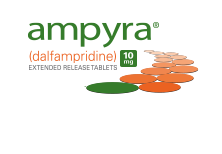Your Connection to AMPYRA® (dalfampridine) Coverage
Improved walking is important. So is having support for AMPYRA® (dalfampridine) Extended Release Tablets, 10 mg, insurance coverage, and help with the out-of-pocket cost of medication.
We created MyAmpyra to make getting AMPYRA as simple as possible by confirming your eligibility for insurance coverage and enrollment in our co-pay assistance program.*
*Patients who participate in Medicaid, Medicare, or any other federal healthcare program are not eligible to receive co-pay assistance.
Co-pay assistance may be available
If you have commercial insurance (employer-sponsored or individual), you may be eligible for co-pay assistance where allowed by law.
This co-pay assistance may lower the amount you pay for your AMPYRA prescription to as little as
In many cases, AMPYRA costs less than generic dalfampridine.
†Please note, restrictions apply to Acorda’s co-pay assistance program, including monthly and yearly maximums. Acorda may modify these maximums or discontinue the program at any time. In this case, any change to what commercial patients are required to pay will be communicated to patients by their specialty pharmacy. The actual amount patients have to pay will vary depending upon these maximums and their insurance benefit.
Want to learn more? You can reach MyAmpyra toll-free at 1-888-881-1918, Monday through Friday, from 8 AM to 8 PM Eastern Time.
Indication
AMPYRA® (dalfampridine) Extended Release Tablets, 10 mg, is the first and only brand prescription medicine indicated to help improve walking in adults with multiple sclerosis (MS). This was demonstrated by an increase in walking speed.
Important Safety Information
Do not take AMPYRA if you have ever had a seizure, have certain types of kidney problems, or are allergic to dalfampridine (4-aminopyridine), the active ingredient in AMPYRA.
Indication & Important Safety Information
INDICATION
AMPYRA® (dalfampridine) Extended Release Tablets, 10 mg, is the first and only brand prescription medicine indicated to help improve walking in adults with multiple sclerosis (MS). This was demonstrated by an increase in walking speed.
IMPORTANT SAFETY INFORMATION
Do not take AMPYRA if you:
- have ever had a seizure,
- have certain types of kidney problems, or
- are allergic to dalfampridine (4-aminopyridine), the active ingredient in AMPYRA.
Take AMPYRA exactly as prescribed by your doctor.
Before taking AMPYRA, tell your doctor if you:
- have any other medical conditions
- are taking compounded 4-aminopyridine
- are taking any other prescription or OTC medicines, such as cimetidine
- are pregnant or plan to become pregnant. It is not known if AMPYRA will harm your unborn baby.
- are breastfeeding or plan to breastfeed. It is not known if AMPYRA passes into your breast milk. Talk with your healthcare provider about the best way to feed your baby if you take AMPYRA.
Stop taking AMPYRA and call your doctor right away if you have a seizure while taking AMPYRA. You could have a seizure even if you never had a seizure before. Your chance of having a seizure is higher if you take too much AMPYRA or if your kidneys have a mild decrease of function, which is common after age 50. Your doctor may do a blood test to check how well your kidneys are working before you start AMPYRA.
AMPYRA should not be taken with other forms of 4-aminopyridine (4-AP, fampridine), since the active ingredient is the same.
AMPYRA may cause dizziness or vertigo. If you have these symptoms do not drive, operate machinery or do other dangerous activities.
AMPYRA may cause serious side effects, including severe allergic reactions. Stop taking AMPYRA and call your doctor right away or get emergency medical help if you have shortness of breath or trouble breathing, swelling of your throat or tongue, or hives.
The most common side effects for AMPYRA in MS patients were urinary tract infection; trouble sleeping; dizziness; headache; nausea; weakness; back pain; problems with balance; multiple sclerosis relapse; burning, tingling, or itching of your skin; irritation in your nose and throat; constipation; indigestion; and pain in your throat.
Please see the Patient Medication Guide.







